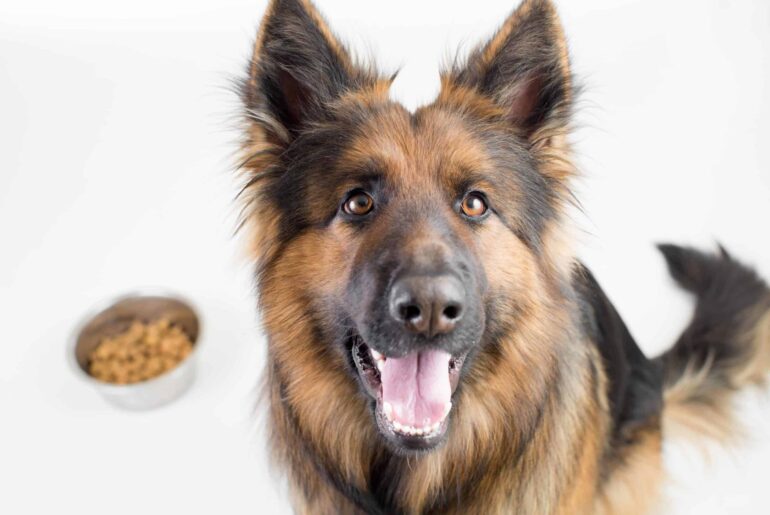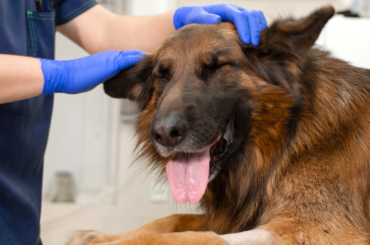Embarking on a journey to change your German Shepherd’s diet can be a significant decision, driven by various factors such as health concerns, age, or a desire for a more tailored nutritional approach. However, the question arises: Can you change your German Shepherd’s diet abruptly? In this comprehensive guide, we’ll delve into the reasons why a gradual transition is recommended, explore the potential consequences of sudden diet changes, and provide practical examples to ensure a smooth and successful shift in your dog’s nutritional regimen.
The Digestive Sensitivity of German Shepherds:
German Shepherds, like many dog breeds, have sensitive digestive systems. Abrupt changes to their diet can lead to gastrointestinal upset, resulting in symptoms such as diarrhea, vomiting, or stomach discomfort. Understanding the reasons behind the digestive sensitivity of German Shepherds is crucial before considering a change in their nutritional intake.
- Microbiome Adjustment:
- Dogs have a delicate balance of microorganisms in their gut that aid in digestion. A sudden change in diet can disrupt this balance, causing digestive issues as the microbiome adjusts to the new food.
- Enzyme Production:
- The production of digestive enzymes in a dog’s body is influenced by their regular diet. Abrupt changes may challenge the digestive system’s ability to produce the necessary enzymes for breaking down different types of food.
- Stress on the Digestive System:
- Rapid shifts in diet can stress the digestive system, leading to inflammation and discomfort. This stress is particularly significant for German Shepherds, known for their susceptibility to digestive issues.
The Importance of a Gradual Transition:

Transitioning your German Shepherd’s diet gradually is not just a recommendation; it’s a key practice for ensuring their digestive well-being and overall health. Here’s why a gradual approach is crucial:
- Preventing Digestive Upset:
- A gradual transition allows your dog’s digestive system to adapt to the new food slowly, minimizing the risk of digestive upset. This approach is especially important for dogs prone to gastrointestinal sensitivity.
- Adapting the Microbiome:
- Microorganisms in the gut play a vital role in digestion and overall health. A gradual transition provides time for the microbiome to adapt to the new food, promoting a healthier balance of gut bacteria.
- Reducing Stress:
- Sudden diet changes can be stressful for dogs. By easing into the new food, you reduce the stress on your German Shepherd’s digestive system, making the transition more comfortable for them.
- Observing Behavioral Changes:
- A gradual transition allows you to closely monitor your dog for any behavioral changes, energy level alterations, or signs of discomfort. This observational period is essential for ensuring that the new diet suits your German Shepherd’s individual needs.
- Establishing Consistency:
- Dogs thrive on routine and consistency. A gradual transition helps maintain a consistent feeding schedule, providing a sense of security for your German Shepherd during the dietary change.
Practical Examples of a Gradual Transition:
Now that we’ve highlighted the importance of a gradual transition, let’s explore practical examples to guide you through the process:
- Week 1: Introduction of New Food (25%):
- Start by introducing the new food in a small proportion, around 25% of the total meal. Mix this portion with your dog’s current food, maintaining a familiar taste while slowly incorporating the new elements.
- Example: If your German Shepherd normally eats 2 cups of their current food, provide 1.5 cups of the familiar food and 0.5 cups of the new food for each meal.
- Week 2: Balanced Proportions (50%):
- Progress to a 50-50 mix of the old and new food. This balanced ratio allows your dog to become accustomed to the taste and texture of the new diet without overwhelming their digestive system.
- Example: If your dog consumes 2 cups per meal, offer an equal mix of 1 cup of each type of food.
- Week 3: Increased Proportion of New Food (75%):
- Gradually increase the proportion of the new food to 75% of the total meal. This step further acclimates your German Shepherd to the new diet while minimizing the risk of digestive upset.
- Example: If your dog’s meal consists of 2 cups, provide 1.5 cups of the new food and 0.5 cups of the old food.
- Week 4: Full Transition (100% New Food):
- By the fourth week, your German Shepherd should be ready for a complete transition to the new food. Now, you can offer the new food exclusively for each meal.
- Example: Provide a full 2 cups of the new food per meal.
Additional Tips for a Successful Transition:
- Monitoring and Adjusting:
- Throughout the transition, closely monitor your German Shepherd for any signs of digestive upset or behavioral changes. If needed, slow down the process or return to the previous diet temporarily.
- Hydration:
- Ensure your dog has access to fresh water at all times. Proper hydration supports the digestive process and overall well-being.
- Veterinary Consultation:
- Before initiating any diet change, consult with your veterinarian. They can provide personalized advice based on your German Shepherd’s health status, dietary needs, and potential sensitivities.
- Consider Special Diets:
- If your dog has specific health conditions or dietary requirements, your veterinarian may recommend a specialized diet. Follow their guidance for a successful transition.
Conclusion:
Changing your German Shepherd’s diet is a significant decision that requires careful consideration and a patient approach. A gradual transition not only prevents digestive upset but also ensures a smoother adaptation to the new food. By following practical examples and incorporating additional tips, you can provide your German Shepherd with a positive and stress-free dietary transition, contributing to their overall health and well-being. Always prioritize your dog’s individual needs, consult with your veterinarian, and make informed choices to support their lifelong nutritional journey.






